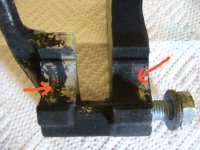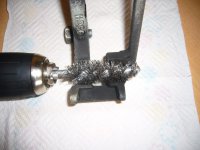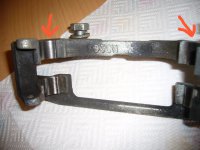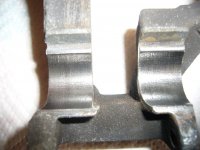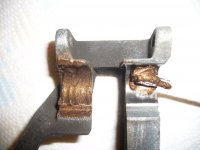I've noticed there's been a lot of posts on this topic & perhaps it's time I shared my thoughts on what seems to be a common problem. If you've experienced any of the following:
- squeaking & grinding noise from the brakes
- pedal vibration under heavy braking
- excessive pad &/or disc wear
- excessive build up of brake dust on the wheels
- poor fuel consumption
then you might want to read on.
My investigations have thus far been confined to the front brakes on the 1.2 500 & Panda (which have identical systems EXCEPT there is no brake wear warning wire on the Panda), but I'd expect to find something broadly similar with the rear setup on the 1.4.
I've now stripped down the brakes on both my cars in order to address one or more of the issues identified above. Here's what I've found.
The brakes are of a single piston floating caliper design, sliding on a single bolt at the top, and retained by a simple pin at the bottom. The bolt on which the caliper slides is well greased when new & is fully enclosed in a protective rubber sleeve. The pads are released by removing the lower pin & (carefully) rotating the caliper out of the way.
I find that on both my cars, once the pads have been removed, the caliper slides freely on its bolt - there is no problem with the design of the caliper and this part of the system works exactly as its designer intended.
Further dismanting involves removing the caliper by unscrewing the single bolt on which it slides, then removing the reaction frame by unscrewing the two bolts which secure it. Once you have removed the reaction frame, inspect the surfaces on which the pads slide & the real cause of all the problems will be obvious.
The reaction frame is made from a grade of cast iron which has a very low corrosion resistance, and even on an almost-new car, these sliding surfaces will be significantly corroded - preventing the pads from sliding freely. This doesn't really affect safety, as there's a huge amount of hydraulic pressure available to force the pads into the disc & stop the car, but there's no comparable force available to help them release afterwards, so instead of moving back out when you take your foot off the pedal, they bind in the frames & cause the brakes to drag - leading to all the problems identified in the introduction. In the worst case, the pads will actually seize solid in the frames & then the hydraulic pressure will start bending the pads. Mark Elvin posted a good picture of what happens if this occurs, here:
http://img.photobucket.com/albums/v337/markelvin/IMAG0156.jpg
The only solution that's actually going to work for any length of time is to remove the reaction frames, thoroughly clean the sliding surfaces, apply a generous helping of copperease & carefully reassemble, taking great care not to get the copperease on the discs. I've now done this to both my cars, and the improvement in braking performance is quite noticeable, particularly when braking gently.
I've attached some pictures to show the process - just click to enlarge. I've included a 'before & after" shot after cleaning out just one side of the frame. The extent of corrosion buildup is remarkable after only a short time in service - the car had done less than 3000 miles when they were taken.
It took a considerable effort with the rotary wire brush to remove the dirt & corrosion & IMO you can't properly fix this without removing the reaction frames from the car, even if you're just changing the pads.
From experience, if you do the cleaning without applying the copperease, the brakes will work perfectly for about a week - then they will start corroding again & you'll soon be back where you started.
In particular, please don't try to fix this problem by pressure washing the brakes. It won't work and you run the considerable risk of forcing water past the seals, which will quickly ruin the caliper.
Hope you find this useful. Follow the instructions carefully & I'll practically guarantee an end to most of the common brake problems reported here.
- squeaking & grinding noise from the brakes
- pedal vibration under heavy braking
- excessive pad &/or disc wear
- excessive build up of brake dust on the wheels
- poor fuel consumption
then you might want to read on.
My investigations have thus far been confined to the front brakes on the 1.2 500 & Panda (which have identical systems EXCEPT there is no brake wear warning wire on the Panda), but I'd expect to find something broadly similar with the rear setup on the 1.4.
I've now stripped down the brakes on both my cars in order to address one or more of the issues identified above. Here's what I've found.
The brakes are of a single piston floating caliper design, sliding on a single bolt at the top, and retained by a simple pin at the bottom. The bolt on which the caliper slides is well greased when new & is fully enclosed in a protective rubber sleeve. The pads are released by removing the lower pin & (carefully) rotating the caliper out of the way.
I find that on both my cars, once the pads have been removed, the caliper slides freely on its bolt - there is no problem with the design of the caliper and this part of the system works exactly as its designer intended.
Further dismanting involves removing the caliper by unscrewing the single bolt on which it slides, then removing the reaction frame by unscrewing the two bolts which secure it. Once you have removed the reaction frame, inspect the surfaces on which the pads slide & the real cause of all the problems will be obvious.
The reaction frame is made from a grade of cast iron which has a very low corrosion resistance, and even on an almost-new car, these sliding surfaces will be significantly corroded - preventing the pads from sliding freely. This doesn't really affect safety, as there's a huge amount of hydraulic pressure available to force the pads into the disc & stop the car, but there's no comparable force available to help them release afterwards, so instead of moving back out when you take your foot off the pedal, they bind in the frames & cause the brakes to drag - leading to all the problems identified in the introduction. In the worst case, the pads will actually seize solid in the frames & then the hydraulic pressure will start bending the pads. Mark Elvin posted a good picture of what happens if this occurs, here:
http://img.photobucket.com/albums/v337/markelvin/IMAG0156.jpg
The only solution that's actually going to work for any length of time is to remove the reaction frames, thoroughly clean the sliding surfaces, apply a generous helping of copperease & carefully reassemble, taking great care not to get the copperease on the discs. I've now done this to both my cars, and the improvement in braking performance is quite noticeable, particularly when braking gently.
I've attached some pictures to show the process - just click to enlarge. I've included a 'before & after" shot after cleaning out just one side of the frame. The extent of corrosion buildup is remarkable after only a short time in service - the car had done less than 3000 miles when they were taken.
It took a considerable effort with the rotary wire brush to remove the dirt & corrosion & IMO you can't properly fix this without removing the reaction frames from the car, even if you're just changing the pads.
From experience, if you do the cleaning without applying the copperease, the brakes will work perfectly for about a week - then they will start corroding again & you'll soon be back where you started.
In particular, please don't try to fix this problem by pressure washing the brakes. It won't work and you run the considerable risk of forcing water past the seals, which will quickly ruin the caliper.
Hope you find this useful. Follow the instructions carefully & I'll practically guarantee an end to most of the common brake problems reported here.
Attachments
Last edited:


